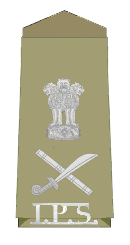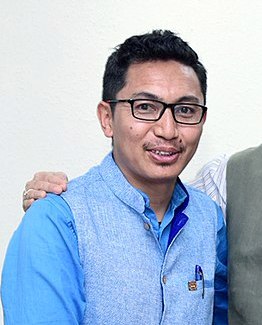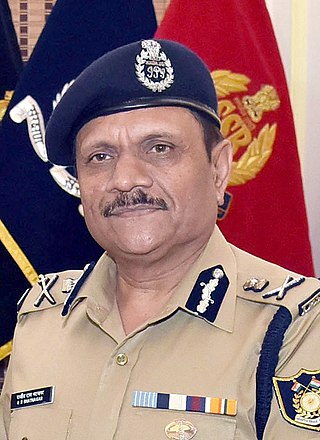
Ladakh is a region administered by India as a union territory and constitutes an eastern portion of the larger Kashmir region that has been the subject of a dispute between India and Pakistan since 1947 and India and China since 1959. Ladakh is bordered by the Tibet Autonomous Region to the east, the Indian state of Himachal Pradesh to the south, both the Indian-administered union territory of Jammu and Kashmir and the Pakistan-administered Gilgit-Baltistan to the west, and the southwest corner of Xinjiang across the Karakoram Pass in the far north. It extends from the Siachen Glacier in the Karakoram range to the north to the main Great Himalayas to the south. The eastern end, consisting of the uninhabited Aksai Chin plains, is claimed by the Indian Government as part of Ladakh, and has been under Chinese control since 1962.

Director general of police (DGP) is a rank in the Indian Police Service, held by the highest ranking police officer in a State or a Union Territory of India, typically heading the state or the UT police force. The DGP is appointed by the cabinet and holds a three-star rank.
The Government of Delhi, officially the Government of the National Capital Territory of Delhi (GNCTD) is the governing body of the Union Territory of Delhi, whose urban area is the seat of the Government of India. It also governs the city or local governments in the area as per the 74th Constitutional Amendment Act.

A union territory is a type of administrative division in the Republic of India. Unlike the states of India, which have their own governments, union territories are federal territories governed, in part or in whole, by the Union Government of India. There are currently eight union territories in India, namely Andaman and Nicobar Islands, Chandigarh, Dadra and Nagar Haveli and Daman and Diu, Delhi, Jammu and Kashmir, Ladakh, Lakshadweep and Puducherry.

The Government of Jammu and Kashmir is the governing authority of the Indian union territory of Jammu and Kashmir and its two divisions and 20 districts.
The Jammu and Kashmir Legislative Assembly also known as the Jammu and Kashmir Vidhan Sabha is the legislature of Indian union territory of Jammu and Kashmir.

Girish Chandra Murmu is the 14th Comptroller and Auditor General of India and the external auditor of the Inter-Parliamentary Union. He is also the chairman of the United Nations Panel of External Auditors and the Asian Organization of Supreme Audit Institutions. He is currently the external auditor of the WHO (2020-2023), succeeding the Auditor General of the Philippines. He was the Inaugural Lieutenant Governor of the Union Territory of Jammu and Kashmir till 6 August 2020. He is a 1985 batch IAS officer of Gujarat cadre and was principal secretary to Narendra Modi during his tenure as the Chief Minister of Gujarat.

Jamyang Tsering Namgyal is an Indian politician and Member of Parliament from Ladakh, India's largest parliamentary seat geographically. Namgyal was elected, on 9 November 2018, to be the youngest and 8th Chief Executive Councillor (CEC) of Ladakh Autonomous Hill Development Council, Leh. He belongs to the Bharatiya Janata Party (BJP).

Jammu and Kashmir is a region administered by India as a union territory and consists of the southern portion of the larger Kashmir region, which has been the subject of a dispute between India and Pakistan since 1947 and between India and China since 1959. The Line of Control separates Jammu and Kashmir from the Pakistani-administered territories of Azad Kashmir and Gilgit-Baltistan in the west and north. It lies to the north of the Indian states of Himachal Pradesh and Punjab and to the west of Ladakh which is administered by India as a union territory.
The Jammu and Kashmir Reorganisation Act, 2019 is an act of the parliament of India containing provisions to reconstitute the Indian-administered state of Jammu and Kashmir into two Indian-administered union territories (UTs) called Jammu and Kashmir, and Ladakh, and becoming effective on 31 October 2019. A bill for the act was introduced by the Minister of Home Affairs, Amit Shah, in the Rajya Sabha on 5 August 2019 and was passed on the same day. It was then passed by the Lok Sabha on 6 August 2019 and it received the president's assent on 9 August 2019.

The Emblem of Jammu and Kashmir is an official symbol used to represent the government of Jammu and Kashmir, a region administered by India as a union territory.

Ladakh Police is the police agency responsible for law enforcement and investigations within the Union territory of Ladakh, India. It came into existence on 31 October 2019.

The Administration of Union Territory of Ladakh(sic) is the governing authority of the Indian union territory of Ladakh and its two districts. The Administration is led by a Lieutenant Governor appointed by the President of India who acts on behalf of the central Government of India. Ladakh does not have an elected legislative assembly. The two districts of Ladakh both elect their own autonomous district council-the Leh Autonomous Hill development council and the Kargil Autonomous Hill development Council, which have competence over a range of domestic affairs.

University of Ladakh (UOL) or Ladakh University, is a public university located in Indian Union territory of Ladakh. It was established on 16 December 2018 by The University of Ladakh Act, 2018 of Government of Jammu and Kashmir. It is a cluster university comprising degree colleges of Leh, Kargil, Nubra Valley, Zanskar, Dras and Khalatse.

Lieutenant General Vinod G. Khandare, PVSM, AVSM, SM is a former officer of the Indian Army and is currently serving as the Principal Adviser in the Ministry of Defence. He retired from active military service on 31 January 2018 and was the Military Advisor to the National Security Council Secretariat of India at the Secretary level from 2018 to 2021. In his final active military appointment, he served as both the Director General of the Defence Intelligence Agency and the Deputy Chief of Integrated Defence Staff for Intelligence from November 2015 to January 2018.

Rajiv Rai Bhatnagar is a retired Indian Police Service-1983 batch officer of the Uttar Pradesh cadre. Served in different capacities in the various state and central law enforcement organisations, Bhatnagar received the President's Police Medal for Distinguished Service on 15 August 2007. He served as the Director General of the Central Reserve Police Force (CRPF) in his last tenure of service till his retirement on 31 December 2019. He was appointed an advisor to the Lieutenant Governor of Jammu and Kashmir G. C. Murmu by the Government of India in January 2020.
Manoj Yadava is an Indian police officer who is DG of Railway Protection Force and former Director General of Police of Haryana Police. He had previously held the post of joint director of the Intelligence Bureau at the Union Home Ministry (MHA).












